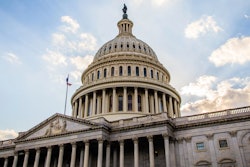Joel Anderson spent his childhood watching buses barreling down U.S. 67, passing his hometown of Swifton on a 50-mile daily journey to schools that wouldn’t reject the Black children on board for the color of their skin.
In his segregated schools, Anderson, who is White, heard jokes and taunts about his Black peers, but he was largely unaware of situations he would later come to view as injustices.
He developed a passion for racial equality as a freshman at Harding University, where a mix of conversations with peers from integrated schools and teachings on biblical principles led him to examine his worldview.
“Jesus said the greatest commandment is to love the Lord your God with all your heart, soul, mind and strength and to love your neighbor as yourself,” Anderson says. “Neither one of them is optional.” This teaching made it unacceptable to split school enrollment by racial lines or to allow violence against civil-rights workers to go unchallenged, he says.
Anderson, now the chancellor of the University of Arkansas at Little Rock (UALR), encounters attitudes that echo the naiveté of his youth when he returns to his rural northeast Arkansas birthplace.
It’s a situation he hopes to change.
In November, UA trustees approved Anderson’s plans to establish an Institute on Race and Ethnicity on the Little Rock campus, a project that grew from a commitment he made when he took office to make diversity a defining mark of his administration.
The institute, set to launch this fall, will serve as an “information clearinghouse,” collecting research, statistics and historical materials related to race relations in the state. Faculty associates from a variety of disciplines will contribute to its research, and students will be invited to develop projects related to the institute’s mission.
Patterned after similar programs in Mississippi and Minnesota, the institute will aid in mediated discussions on race throughout the state.
Little Rock is an ideal place for such an academic center, Anderson says. The university has a history of involvement with city and state projects, and the state is known throughout the country for turmoil surrounding the integration of Black students at Central High School.
Little Rock Central High School became internationally known in 1957, when nine Black students integrated the school. Until then, segregation laws barred Black students from Central.
Vestiges of that era live on in Arkansas, with recent convictions and indictments in separate rural cross burnings and education leaders pointing to persistent achievement gaps between Black and White students in public schools.
“Community leaders, both public and private, have told us through the years that they want the university to help solve major community problems,” Anderson said. “Race has long been at the top of the list.”
Personal Stories
UALR leaders visited four academic centers focused on race relations as they drafted plans for the Arkansas institute.
The William Winter Institute for Racial Reconciliation at the University of Mississippi, named for civil rights champion and former Mississippi Gov. William Winter, most closely reflects the mission of the UALR project.
Founded in 1999, the center compiles oral-history projects, coordinates the work of civil rights groups, presses for convictions in decades-old killings, and answers invitations from communities to mediate discussions about decades-old racial conflicts and tension.
“When they are at their best, in my opinion, universities engage in public service as well as education and research,” says institute director Susan Glisson.
That research adds a stability to emotionally charged discussions and grounds debates about solutions, she says.
“So much of the conversations of race are very emotional, often only centered around perception and stereotypes,” Glisson says.
The center only goes to communities where it is invited, gathering interested parties to break into small clusters and tell personal stories. Through these stories, participants can build a common understanding, break through misconceptions and work toward a solution, she says.
The Winter Institute is perhaps best known for its 2004 dialogues in Philadelphia, Miss., where civil rights workers James Chaney, 21, Andrew Goodman, 20, and Michael Schwerner, 24, were lynched in 1964. The men investigated the burning of a nearby church known for its support of the civil-rights movement and participated in “freedom summer,” a drive to register Black voters in the South.
Their killers included members of the Ku Klux Klan and local law enforcement officials, according to the Mississippi Civil Rights Project, a database of county-by-county civil rights history supported by the Winter Institute.
Anticipating an onslaught of media attention, community members contacted the Winter Institute before the killings’ 40-year anniversary.
“They wanted to tell their own story,” Glisson says. “But they realized they weren’t even speaking the same language.” White community members pushed for a proclamation in recognition of the milestone. Black residents pushed for a march for justice. No agreement could be found.
“When White people hear march, they think riot. They think Birmingham. They think dogs and all this dramatic stuff,” Glisson says. “For Black folks and Choctaw folks who live in the community, a proclamation is just words on a page.”
After eight weeks of telling stories, the group determined that the only way to move past the killings was to seek justice in the case. They drafted a letter urging the governor and district attorney to close the book on the murders in court. In 2005, Mississippi Attorney General Jim Hood brought charges against Edgar Ray Killen. Forty-one years after the killings, Killen was sentenced to 60 years in prison for manslaughter.
Residents say the conviction helped heal the town.
“History, good or bad, leaves a mark,” says James Young, who participated in the dialogue. “In our case, it was a hurt. It was a wound.” Young, who is Black, was 9 when the three men were killed. He remembers his parents’ reactions and the anger in the city.
“I didn’t fully understand that magnitude, but I understood the tension,” he says. “I understood the fight. I understood the unfairness.” Today, Young serves as the majority-White town’s first Black mayor.
“I hear people say, ‘I’m not ashamed of Philadelphia anymore,’” he says.
Community Involvement
Leaders of two Arkansas communities have contacted Anderson about working with the institute on race-related issues. The chancellor refused to elaborate on the circumstances, saying he wanted to protect the groups’ identities until work with the institute starts.
“I don’t think success is ever assured, but I have confidence that we can be helpful in almost every situation,” Anderson sys.
The idea for the institute sprang from Anderson’s regular Monday meeting of a diverse group of faculty, staff and administrators. A planning meeting this summer drew interest from local leaders, including Little Rock City Manager Bruce Moore.
“You’d have a hard time coming up with a local goal that the issue of race is not entwined in,” Anderson says. “It’s just that pervasive.”
UALR’s Institute of Government has conducted surveys on racial perceptions in Pulaski County for the past seven years. The surveys show persistent gaps in understanding between Arkansas’ Black, White and Hispanic residents.
A 2006 survey, for example, showed that 71 percent of the city’s White residents think the city’s Black and White residents are treated the same. Just 45 percent of Black residents surveyed perceived the same equality.
The new institute is conducting a national search for a director. Anderson is working to build an endowment for the program, starting with a $200,000 grant from the Donaghey Foundation.
He is hopeful that the program can help mend communities and bring awareness of racial conflict to Arkansans.
“The time is ripe for this,” he says. “This is a strategic issue for our community and our state.”















